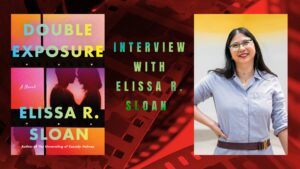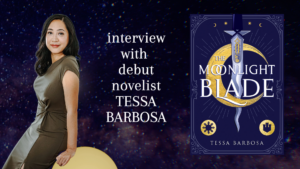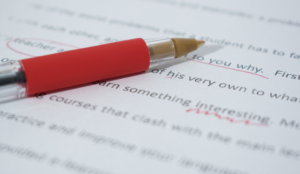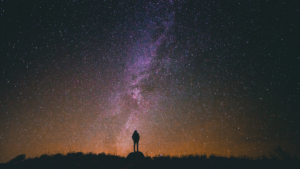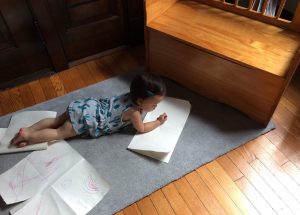Posts by Kristan Hoffman
Elissa R. Sloan and I both grew up as half-Asians in Houston in the 1980s and 90s. We never went to the same school, but we had lots of friends in common, which eventually led to us connecting through social media and bonding over books, music, and other pop culture. Turns out, we had another big thing in common too: the dream of writing and publishing.
Now, Elissa’s third novel Double Exposure is coming out on Sep 10, 2024! I recently had the privilege of reading an early copy, and I’m excited to be in conversation with Elissa about her new book today.
Double Exposure is “a sweeping drama about two A-list stars as they cross each other’s paths over and over again through the years, in a story that examines the work we have to do in order to grow into the people we want to become.”
KH: Wow, I love that pitch. And it does a great job showing that Double Exposure goes deeper than the “gossip and gloss” of celebrity coverage on the internet or in magazines. There is a lot of social and political commentary embedded in the story of Maiko and Adrian’s lives. What compelled you to write about all this?
ERS: I started writing DOUBLE EXPOSURE in June 2022, right after the Dobbs decision. I knew I wanted a character to have an abortion in the first line, because I was angry, and when I’m feeling an intense emotion I tend to write. That first line has remained through all the revisions and rewrites. (For all three of my published novels, this pattern holds: the first line I wrote in the document ends up staying the first line throughout.)
I also knew I wanted an Asian-American lead, because my first two novels were predominantly about white women, and I was tired of that.
As for the story… I love second-chance romances. I had been working on a Persuasion retelling for a couple of years that was going nowhere, so I thought it would be interesting to write a whole new story about two people fated to be together, but the first time around, they couldn’t get over their individual obstacles to make the relationship work. The idea of two people growing, learning, becoming better versions of themselves and finding each other again really appealed to me.
And of course it had to be a Hollywood story, because I find the whole Hollywood culture so absorbing.
Read MoreFriends, last year was a doozy for me. The gap between all the hope-filled plans I was spinning, and the cold hard reality that I actually ended up living, felt like the Grand Canyon on steroids. Let me do my best to summarize the key events, because they provide context for why I decided to attend the San Francisco Writers Conference a couple weeks ago, and what I got out of it.
January 2023 – This is going to be my year! We are coming out of the pandemic! My kids are finally settled into full-time schooling! I am going to write again! More specifically: I am going to finish a new manuscript and send it to my agent!
February 2023 – NOPE. Instead: Mental health collapse! Three years of parenting small children through a global pandemic has taken its toll, and then a short-term family situation pushes me over the edge. I schedule my first ever therapy session. That very same week, my beloved agent informs me that she is leaving publishing. HAHAHAHA WHAT. Well, I guess it’s a good thing I’m already starting therapy…
March 2023 – Next up: Identity crisis. Am I a writer anymore? Do I want to be? Do I need to be? What does my life look like without writing? In fairness, I am already not writing very much… But I mean, what would it look like if I removed even the intention to write? Should I… Should I try it??
April 2023 – Trying it. Not loving it.
May 2023 – Okay, the upside is, I no longer end every day feeling bad about myself for not writing enough. (Or not writing at all.) That part is nice! The downside is, I very much still want to be writing.
In June 2023, two things happened that would help me greatly on my path back to the page. First, I started reading again. Not just dribs and drabs, but four-course meals of reading. Feasts of reading. Belly-so-full-it-hurts-and-yet-I-have-no-regrets of reading.
Second, I emailed Therese to ask if someone could cover my next Writer Unboxed post. I just didn’t have it in me to talk about writing. At that moment in my life, I wasn’t sure how — or even if — writing was going to figure into my future.
Therese responded graciously, of course. She told me not to worry about the post, and she also asked if it would be useful to me, in my wandering (mucking?) through all this, to attend the Writer Unboxed UnConference in November. If so, she would help me make it happen.
Unfortunately, due to various obligations, I couldn’t go to the UnConference — but my husband found space in his (insane) work schedule and gifted me a trip out to the San Francisco Writers Conference instead. I was hesitant at first. The cost! The time away from our kids, and the burden on my husband to solo-parent for so many days! Also, I wouldn’t know anybody like I would have at the UnConference!
But underneath all those concerns was this one true thing, a small voice gently ringing out from within me: I really wanted to go. I yearned to be […]
Read MoreFor nearly a decade, I read 40-60 books a year. Then I had kids. Suddenly I was lucky if I could hit double digits by winter. Then there was a global pandemic, and I was lucky if I could hit double digits at all! Not that the number matters, of course. Nobody was counting (except my annual GoodReads Challenge tracker) and anyways, I firmly believe in quality over quantity.
That being said, there is no question that I am a happier person and better version of myself when I am reading. I imagine that is probably true for many of us writerly people, no? So this past summer, with the pandemic being “over” and my kids being marginally more self-sufficient, I was finally able to shake off my slump — and it felt like coming up for air after nearly drowning.
Whereas I had been going weeks between books, now I was flowing from one to the next in fairly quick succession, and in doing so, I found that my brain couldn’t help but carry on its internal conversation from Novel A to Novel B to Novel C… My mind kept sparking on connections between them, comparing and contrasting, finding patterns and through-threads, even though they didn’t necessarily seem related at first, and even though the order in which I read them was fairly random.
(I have many, many, many piles of books all over my house, and no plan or system for how to choose from amongst them. Again, probably true for most of us?)
Today I want to share a few of the observations I made from a handful of recent reads. These things may not be new or revolutionary, but they struck me nonetheless.
1. Concept is only a starting point.
“High concept” is a popular buzzword in entertainment. But it’s also kind of a trap. Because it encourages us to glorify the idea of a good idea, when the truth is, good ideas are just the beginning.
Three, arguably four, of these novels could have sprouted from the same basic seed: “celebrity romance.” But they are all totally different.
In Hayley Aldridge Is Still Here by Elissa R. Sloan, a former child actress recounts her life story to her daughters in order to convince them to help her escape an oppressive conservatorship. I wouldn’t actually call this book a romance, and yet the ups and downs of Hayley’s love life play a pivotal role in how her story unfolds.
In Romantic Comedy by Curtis Sittenfeld, a staff writer for a popular, nationally televised sketch comedy show finds herself courted by a pop music heartthrob. This book does lean into its name, but it also carries a slight political streak, as well as reveling in the joys (and frustrations) of a professionally creative life.
The most clear-cut “celebrity romance” book in this set is The Reunion by Kayla Olson, in which a new script brings together two former costars after a decade apart, and their old feelings quickly resurface. Sweet and simple, this novel is a good example of satisfying reader’s expectations in a genre.
Last but not least, in Everyone Wants to Know by Kelly Loy Gilbert, the daughter of famous […]
Read MoreToday I am delighted to present a conversation with our very own Tessa Barbosa, whose riveting debut novel THE MOONLIGHT BLADE came out yesterday. Tessa is a regular contributor here at Writer Unboxed, as well as a dear friend. We “met” maybe a decade ago through blogging, and bonded over our hyphenate identities and how that impacts our lives and our work. We’ve gone through many milestones in parallel over the years — from writing (and scrapping) manuscripts, to becoming mothers, to querying and being on submission… She is a gem of a person and a heck of a writer, and I’m over the moon that so many readers are about to discover her!
Let’s find out more about Tessa’s book, and her journey to this point.
KH: First, can you give a quick pitch of THE MOONLIGHT BLADE?
TB: Of course! It’s a story about a cursed girl who enters a deadly magical competition to save her condemned mother. She doesn’t know why her mother was arrested, but she soon discovers that she is the center of a conspiracy that spans past lives. If she doesn’t solve the mystery of who she is, and who she was, her curse could destroy the whole country – again.
KH: Phew, that’s a lot — in a good way! To me, THE MOONLIGHT BLADE felt like like a dash of Hunger Games (teens fighting to the death for a dubious distinction) + a spoonful of Laini Taylor (monsters, magic, past lives coming to bear) + a dozen heaping scoops of Tessa Barbosa (Filipino culture, family bonds, beautiful writing), which results in a story that’s incredibly fresh and vibrant, unlike anything I’ve read in a long long time.
What was the genesis of this story? How did THE MOONLIGHT BLADE start for you, and how did it come together?
TB: When I started writing it, I had a year old baby, and I’d taken a forced break from writing, because my pregnancy and newborn experience was so difficult. My daughter refused to sleep and cried constantly for 7 months straight. Every day I hoped it might get easier, but it didn’t for a long time. I was sleep deprived, and this story about complicated relationships between mothers and daughters, plus high stakes and a lot of pressure, somehow just poured out the moment I had a little free time again. It didn’t take long to draft the novel, but it took a substantial amount of time for me to revise it, because editing was a skill I didn’t have a lot of experience with yet.
KH: Oof, I’ve been there… With a tough baby, I mean. Never had a book pour out of me, sadly!
Your editing muscles must be incredible now, because Narra’s story is so powerful and layered. There is the mystery of her mother’s crime, the mystery of her connection to Teloh, the mystery of who is conspiring within the Fortress, and of course, the Sundo competition itself. How did you manage all these threads throughout the writing and editing processes?
TB: Staying VERY VERY organized. I have lists for everything, including a “story bible” which is an Excel spreadsheet with a description of every […]
Read MoreSpooky season is here — and what could be more horrifying or haunting to a writer than the projects that have met tragic ends?
Whether big or small, we all have a graveyard of failed work. The novels we got 10K words into, and then just lost steam on. The essay that never quite came together. The manuscript that garnered a decent number of requests from agents, yet couldn’t land an offer. The seeds of ideas that simply never managed to grow into anything more.
Some of these deaths hurt more than others. My personal cemetery includes all of them and more.
Because I am a slow writer, the most common cause of death for my writing projects is running out of momentum, interest, or relevance. Similar to tombstones marked with the years of birth and death, my hard drive is littered with files labeled “Road Trip Novel (2016 version),” then “Road Trip Novel (2018 version),” then “Road Trip Novel (2021 version),” and such, until finally I realize it is futile. No matter how many times I try to revive it, the window for this story has already closed. Maybe the headline that inspired it has become old news. Or the internal struggle I was having, and that I built a whole story around, has resolved itself. (More likely, it has been replaced by some new and more pressing anxiety, haha.) Whatever the reason, the fuel for this work has been exhausted, and my energy would be better spent moving on to the next thing. To be fair, this seems like a relatively natural and peaceful way for a story to die.
On the other hand, I’ve had to “murder” a project once or twice, after realizing that I simply wasn’t the best writer to tell it. (Jeanne Kisacky recently opened a good discussion about this right here at Writer Unboxed: “Who Are You Reading Now?”) For example, many years ago, I started a story about a bisexual Black teenager who was being bullied by a former best friend, so her mother sent her to live temporarily with a friend in Barcelona. Certain elements were drawn from my own experiences, and the heart of the story — about a girl who heals herself with the help of found family in a foreign place — still calls to me. But other aspects felt like too much of a stretch for me to write well, and were simply too important to risk getting wrong. For a while, I resisted what had to be done, but eventually I came to see it as a mercy killing, on several levels.
By far the most painful addition to my graveyard came from the manuscript that snagged me two offers of representation from top-notch agents, only to die a drawn-out, back-and-forth death on submission. I spent 3 years writing and revising that book, 3 months querying, 6 months on submission, and finally, at least 9 months in mourning for the future that it (and I) would not get to have. Does it haunt me? Absolutely. In the time since then, I have racked my brain with doubts and second guessing. Was it bad luck, bad timing, bad writing? Should I have just […]
Read MoreFirst, you’re probably wondering, “The Gap? Isn’t that a clothing store?” Well, yes. But that’s not what I’m talking about.
The Gap is the distance between where you are and where you want to be.
For the purposes of this post, I’m specifically talking about The Gap in your writing journey. Maybe you’ve been writing “seriously” for a while now, but you have yet to see one of your stories published. Maybe you’re agented, but you haven’t gotten a book deal. (Hey, that’s me!) Maybe you’ve put a couple solid books on the shelves, but you’re really hoping to break out with the next one, possibly even win an award or land on a bestseller list. Maybe you’re in the midst of NaNoWriMo, and 50K seems impossibly far away.
You, my friend, are in The Gap.
It can be a tough space to operate in, this between-land. Hope and frustration are baked in by definition, and those two ingredients don’t always mix well. Especially the longer that they are forced to interact.
At this point in my life, I’ve been in The Gap longer than anywhere else. I fell in love with writing at the age of 9, and here I am not quite 30 years later, still “on my way” to becoming a novelist.
As certain (arbitrary) milestones passed by unmet — such as publishing my first novel by the time I was 25, then 30, then 35 — I started to feel like I wasn’t allowed to dream big anymore. That I had proven I couldn’t meet certain goals, and thus all future ambitions had to shrink. Both as a way of protecting myself from disappointment, and also as a punishment for my failures.
Only recently have I begun to realize what a harsh and misguided way of thinking that is.
Read MoreWhen I was young, writing didn’t feel mysterious or difficult. I wasn’t curious about other writers’ processes, or searching for the “best” way to develop a story. Writing was just putting pen to paper and seeing what came out. It was a way to pass the time contentedly. It was a way to explore my own mind — what I was curious about, what I remembered, what I longed for.
As I grew older, writing started to feel more Important, both for better and for worse. Writing became a source of pride, because pretty much everyone said I was good at it. But it also became a goal, transforming into a sort of ideal, something farther away and less concrete. Like the difference between the air I had always breathed, and the blue sky way above me, out of reach. Supposedly they were both made of the same stuff, but they felt so distant and different from each other. Suddenly I had to look up and strive.
Put another way: the writing I was doing at the moment didn’t seem to matter as much as the writing I would do in the future, and what that writing could mean. Not mean to me, so much as mean for me. Or mean to other people. Would they like it? Would they think I was talented? Would they pay me for it? Could I build a career? Could I even — dare I say it, dare I dream it — become rich and/or famous?
Ambition can be a powerful motivation, but it can also be a vise, squeezing out passion and creativity. The key, as usual, is to find the right balance for yourself.
Hello and welcome to another Monday, in this, the year of a thousand Mondays.
I don’t want to harp on the obvious, so I’ll just summarize it like this: For many of us, 2020 feels endless and relentless. We are drowning in our feelings about the pandemic, civil unrest, and the upcoming election — and that kind of anxious uncertainty is not ideal for creative pursuits.
Some of you are doing the work anyway, somehow. In all seriousness, kudos! I am eternally impressed by those who get their shit done no matter the circumstances.
Others of us… Well, we’re trying. And that’s not nothing.
But yes, I am finding it harder than ever to make progress on my manuscript right now. Once upon a time, I probably would have considered that a flaw in my character, a personal failure. But if there is one thing I’ve learned over the years, it’s that beating myself up about not writing just leads to more not writing.
And if there’s a second thing I’ve learned over the years, it’s that I am more than my work (or lack thereof).
So instead of falling into those traps, I have been trying to shift my energy toward other writerly things. Things that are still productive, even if they’re not directly related to my work-in-progress.
If you too are needing to come at your writing career sideways for the moment, here are some ideas:
Read MoreLet me be honest: I’m probably not the person you should be taking writing advice from right now. I have a toddler and an infant, which means that most days, I’m just barely hanging on.
(Thankfully, things are getting better now that the baby is sleeping through the night.)
But then again, maybe I’m exactly who you should be taking writing advice from. Because I’ve never had less time, energy, or brain power to spare — and yet here I am, still writing.
(Well, some days.)
Today what I’m offering is a hodgepodge of small, practical things that have been useful to me and my writing lately, in the hopes that you may find something to take away for yourself. There is no through-line between them — and no further preamble!
Read MoreOne of the greatest gifts of parenthood — and perhaps one of the greatest tricks — is that as much as you are teaching and guiding your kids, so too are they teaching and guiding you.
Even though my daughter doesn’t yet comprehend what I do, she has been an invaluable source of inspiration, and education, for my writing. Here are 3 of the biggest lessons — on process, craft, and creativity in general — that I’ve learned from her during our not-quite-3-years together.
1. Have Fun, Be Fearless
I love playing Legos with my daughter. She has no sense of “right” or “wrong” when creating. She just snaps pieces together, following whatever whim strikes her in that moment. All different shapes, sizes, colors…
Everything is possible, and nothing is impossible.
We imagine, build, pretend, destroy, build again.
Nothing is too precious to take apart and use in a new way.
She riffs on things she has seen.
She makes up things she’s never heard of.
It doesn’t have to be logical, it just has to be fun.
There is a purity to her process — or lack thereof — that I envy. For the most part, she does not judge her work or herself. And on the rare occasion that she does get frustrated or disappointed, I am there to remind her: It’s OK not to be good at something right away, to make a mistake. That’s part of the learning process. Whenever you try something new, you will inevitably fail in some way, at some point. But the more you try, the better you will grow.
Sometimes I don’t know if I’m talking more to her or to myself.
Read MoreI recently stumbled across some parenting advice that resonated deeply with me, and if you’ll bear with me, I’ll explain why I think it’s valuable for us to consider in regards to our writing too.
Do not ask your children to strive for extraordinary lives. Such striving may seem admirable, but it is the way of foolishness. Help them instead to find the wonder and the marvel of an ordinary life. Show them the joy of tasting tomatoes, apples and pears. Show them how to cry when pets and people die. Show them the infinite pleasure in the touch of a hand. And make the ordinary come alive for them. The extraordinary will take care of itself.
– William Martin, The Parent’s Tao Te Ching: Ancient Advice for Modern Parents
As a mother, it’s hard for me to look at my two-year-old daughter and not imagine all the amazing things she could do and become. Obviously I want the best for her, and I believe her to be full of limitless potential, capable of reaching the highest heights.
But is it fair to ask that of her? Is it best for her to feel that kind of pressure?
Or would it be better to follow where she leads, and to nurture her interests and skills as they make themselves known? To teach her that life is not a ladder that needs to be climbed to the top, but rather a playground to be explored and enjoyed?
Writers tend to be big dreamers, so it’s no surprise that when we look at our work, we see vast possibilities and hope for resounding success. And don’t get me wrong, hope and possibility are wonderful things.
But over the past few years, I have come to believe that setting them aside is better for the work.
Read MoreMy daughter, who I refer to as IB.
The first time my husband and I talked about having kids, we were in our early 20s, not yet married, and the idea of starting a family felt so far away it might as well have been on the planet Jupiter. But then 22 became 25 became 29. The years blinked away faster than I thought possible.
In that time, I also quit my job in order to focus on writing. I had grand dreams (or delusions?) of long days at the keyboard, words pouring out of me in a great rush, like rice into a pot. But truthfully, I didn’t write that much more than I had while working a day job. I was just happier, because I felt closer to living the writer’s life that I had imagined for myself as a girl.
I finished a manuscript, polished and queried it, and signed with a great agent. We went on submission. I turned 29.
By then, my husband was itching to become a father. In many ways I was ready too, but there was one major roadblock: I had always envisioned becoming an author first, a mother second. So I asked him to wait a little longer, until my book sold. Then we could try for a baby.
My book did not sell.
I could write a whole other post about that — about the slow, silent grief I didn’t even realize I was going through — but suffice it to say, it became clear that I couldn’t keep putting off motherhood. Couldn’t keep tying it to a day that might not come for years.
Throughout my pregnancy, I tried to write. Through the nausea and exhaustion and discomfort, I tried. Ever the optimist, I thought, “At the very least, I can finish a new manuscript and get it to my agent before the baby is due.”
Nope. Just like quitting my job to write full-time did not magically make me a faster writer, neither did getting pregnant.
The baby came — a sweet, tiny little girl — and for those first few months, everything was about her. (Well, and my own recovery.) For the first time in two decades, I put absolutely zero pressure on myself to write. It was foreign, frightening, and a little bit liberating.
Read More

